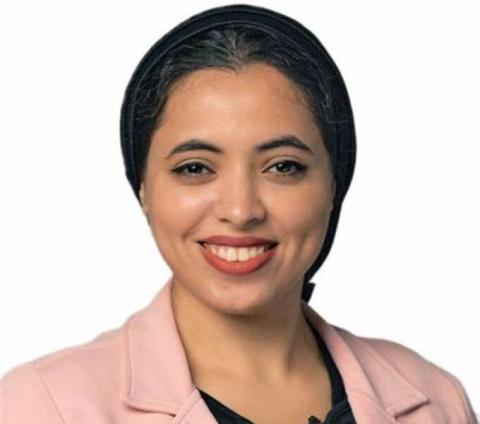
Mona Abdelgaid, a PhD student in the Department of Chemical and Petroleum Engineering at the University of Pittsburgh Swanson School of Engineering, wants to find solutions.
Abdelgaid, whose focus is chemical engineering, recently received four awards for her motivated curiosity and work in the computational design of heterogeneous catalysts, which are considered one of the most critical sciences needed to transition to a carbon-neutral future. Her recognitions include the Richard J. Kokes Travel Award at the 28th North American Catalysis Society; Pittsburgh-Cleveland Catalysis Society-Lubrizol Honorary Lecture Award; American Chemical Society CATL ChemCatBio Travel Award; and Engineering Graduate Student Organization Award, as an outstanding Teaching Assistant in the Chemical Engineering Department, at the University of Pittsburgh.
“I sometimes struggle with imposter syndrome and that I’m not good enough for any type of recognition,” Abdelgaid said. “Receiving these honors is a push forward and gives me the confidence to pursue my research and academic endeavors.”
Her current research focuses on the high-throughput computational design of heterogeneous catalysts that can efficiently convert shale gas-derived light hydrocarbons to olefins by leveraging Density Functional Theory calculations, microkinetic modeling, and kinetic Monte Carlo approaches. Mona’s ultimate research goal is to reduce energy consumption and improve the overall sustainability of alkane dehydrogenation processes.
Giannis Mpourmpakis, an associate professor and bicentennial alumni faculty fellow at the Swanson School, has been working with Abdelgaid for four years and isn’t surprised by her success.
“I could tell by the spark in Mona’s eyes since our first meeting in 2019 that she would be an outstanding researcher,” Mpourmpakis said. “Mona has been working very hard and has a genuine interest to perform fundamental research for energy and environmental applications. Our scientific discussions are always very fun, fruitful and long!”
Abdelgaid, originally from Egypt, came to the United States to study chemical engineering at Montana State University in 2015. Needless to say, it was an adjustment, but because of the experience, she learned how much she loves a challenge.
“It was my first time seeing snow ever, and I was used to only sunshine in Egypt, but it was really important for me,” Abdelgaid said. “I really fell in love with the landscape and learned what I was capable of.”
Her desire to study chemical engineering was born from her love of math and chemistry. Even from a young age, she realized chemical engineering was part of the solution for many challenges facing her home country, like wastewater management and recycling. She participated in the Intel International Science and Engineering Fair in 2014, where she earned the third-place award in the Environmental Management category for her research on addressing water treatment challenges in Egypt. At this young age, she received the Accolade of Excellence from the Egyptian president, Abdel Fattah El-Sisi, in recognition of her scientific contributions.
“Chemical engineering is a large part of so many different industries,” Abdelgaid said. “I knew it was the correct path for me as soon as I left Egypt and came to Montana.”
Whether in the United States or in Egypt, Abelgaid is determined to solve world problems with the tools chemical engineering provides.
Abelgaid’s career aspirations are deeply rooted in academia and driven by a profound passion for both research and education. Her overarching goal is to become a professor in the field of chemical engineering. She aspires to create a holistic learning experience that not only equips students with technical skills but also instills in them a passion for innovation, a commitment to ethical practices, and a sense of responsibility towards the broader community.
“My journey is driven by the desire to unravel complex problems at the intersection of computational chemistry, heterogeneous catalysis, and materials science,” Abelgaid said.
From Pitt SSOE
